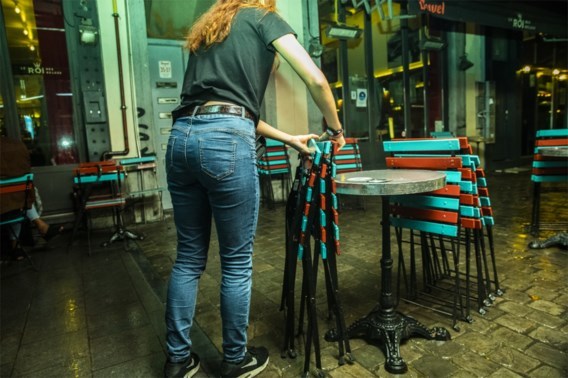For restaurants, the coronavirus measures in Belgium do not change, while bars will have to follow stricter rules and even shut down entirely in Brussels. What is the difference?
The risk of infection is greater in bars and cafés - which were described by Federal Health Minister Frank Vandenbroucke as "real infection hotspots" on Tuesday - than in restaurants, according to the government.
"I am sure that, in a restaurant, there will also be a few people who drink too much and start shouting or singing," Flemish Minister-President Jan Jambon said on Flemish radio.
"But these are rather exceptional cases, whereas this happens more often in café life. In bars, you start drinking until you - so to speak - go outside again. In restaurants, you come to eat," he said.
In Brussels, bars have to shut down completely for a month from Thursday. In the rest of the country, they have to close their doors at 11:00 PM. For restaurants, nothing changes, and they can stay open until 1:00 AM in the country and in the capital.
Related News
- 'Focus on federal rules': bars in Brussels' border municipalities remain open
- Belgium tightens measures: bubbles shrink, bars close early
- Coronavirus: Brussels shuts down bars from tomorrow
This is because there is a clear difference between "nightlife for bars" and "nightlife for restaurants," according to Jambon.
According to Health Minister Vandenbroucke, the coronavirus measures are easier to organise in restaurants. "You sit at the table, and you stay at the table," he said.
At restaurants, ten people can still sit at the same table. "At the table, you have to behave on the basis of the rule that you can only have real physical contact with a few people."
"If you lean against your neighbour, that is close contact. That must be one of your three close contacts," Vandenbroucke said. "Organise yourself at the table in such a way that you are seated close to your close contacts, and do not fall into the arms of your wife's close contacts. It is a matter of common sense."
According to Philippe Trine, president of the Horeca Brussels Federation, restaurants have made "huge investments" to ensure compliance with strict health protocols.
"Not all these measures are necessarily taken in the cafés," he told the Belga news agency. "And even when they are taken, (it is felt) that the atmosphere and alcohol do not encourage respect for them."
However, the situation is very difficult for cafés and bars in Brussels which are in "economic and financial distress," according to Trine. “The government is aware of this and we are waiting to see what aid will be granted. We must trust it."
"I am appalled," said Liza Miller, manager of the bar Le Pantin in Brussels, who added that this month-long closure will be a "catastrophe" for her business. "Most bars follow exactly the same rules as restaurants, I do not understand this difference in treatment."
As it stands, it is not clear how many people actually were infected in a bar. "Of all the positive patients, we only have cluster information from a limited number of people," said infectious disease expert Erika Vlieghe. "There are a number of clusters in there that have been effectively established in hospitality settings."
Vlieghe pointed out that "super spreading events" often happen in crowded areas, where people talk loudly. "If you translate that into situations in real-life, the transmission is likely in busy bars."
Belgium's Crisis Centre is awaiting the Ministerial Decree - which should be published by Friday - to clarify the measure, according to spokesperson Yves Stevens. How the new rules will be made enforceable, will depend on how they are defined in the text.
Maïthé Chini
The Brussels Times

